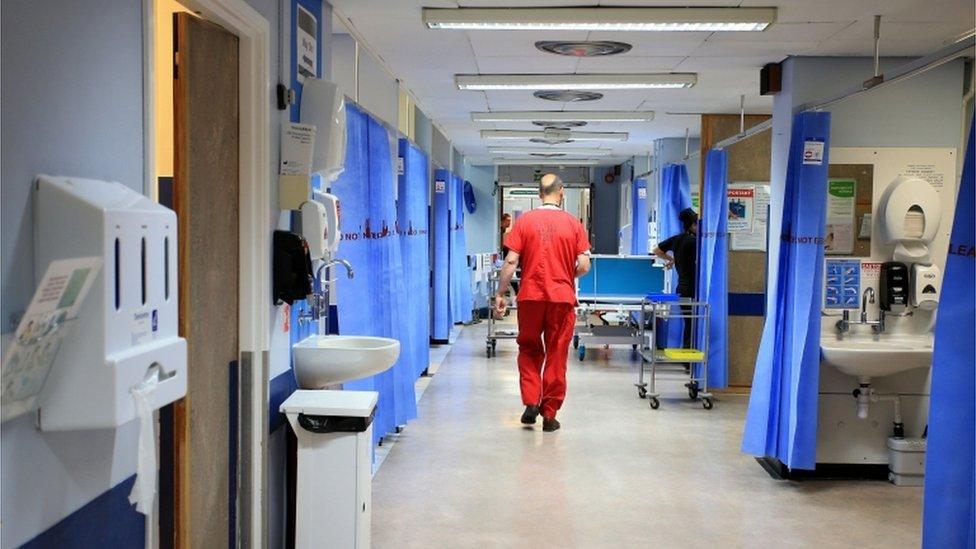Most Covid-19 hospital staff back in their own jobs
- Published

Most Scottish hospital staff who were dealing with coronavirus patients have now returned to their own jobs, health officials have confirmed.
For three months from March, the NHS moved many staff into Covid-19 response teams, with some working at different hospitals from their usual bases.
Many of the NHS's normal functions were postponed as the health service dealt with the impact of the pandemic.
Officials said more activity could now be seen in hospitals.
Theresa Fyffe, the director of the Royal College of Nursing Scotland, said: "It is reassuring to see NHS services are reopening and nursing staff who have been supporting the Covid-19 response are moving back to their substantive posts."
She added many would be physically and mentally exhausted and it was important the impact of the pandemic on nurses and the wider NHS workforce was taken into account as services resumed.
Return to normality
More than 4,000 people have been discharged from Scottish hospitals after receiving treatment for the virus since 5 March.
In recent weeks, the number of new cases of the virus has been low and hospitals have been trying to return to normality.
Dr Jennifer Armstrong, medical director for NHS Greater Glasgow and Clyde, said most staff had now resumed their previous roles and a number of services had restarted.
She said cancer treatment services which continued to operate during the pandemic were in the process of scaling up. Robotic prostate cancer surgery restarted last week as did transplant services, she said.
Dr Armstrong said that last year almost one third of out-patient traffic to the board's hospitals was people giving blood samples.
In order to maintain social distancing, NHS Greater Glasgow and Clyde has set up Acute Phlebotomy Hubs away from the main clinic waiting areas in hospitals. These now have capacity for more than 650 appointments every week.
Technology such as Near Me video and audio consultation, which was found to be "highly effective" during the lockdown, will continue to be used as it means patients can receive consultations from home.
Dr Scott Davidson, respiratory physician and deputy medical director of acute services for NHS Greater Glasgow and Clyde, said: "Within our own ventilation service for example, the Near Me technology has, in recent weeks, been extremely effective in allowing us to review our long-term patients, who are unable to attend the hospital, from the comfort of their own homes."
An NHS Tayside spokeswoman said they were following the Scottish government's remobilisation guidance.
She said: "Over the past three months, the NHS has mobilised to respond to the initial spike in coronavirus across communities, creating Covid-19 capacity in our acute hospitals and new ways of delivering services across our health and social care system in Tayside.
"However, there is now a decreasing trend of Covid-19 positive patients in our hospitals.
"This situation means that our clinical teams can now progress plans which are seeing more activity in our hospitals and in our communities, making sure we keep people safe and treated in the most appropriate environments.
"Our initial plans to restart services cover the period to the end of July 2020, with a further phase which will sustain semi-routine activity in the community and re-introduce more routine elective activity."
NHS Tayside said part of its plan includes the introduction of Green Zones at Ninewells Hospital and Perth Royal Infirmary.
The Green Zones are a number of protected wards and theatre areas to make sure patients are cared for separately from Covid-19 areas.
As with NHS Greater Glasgow and Clyde, NHS Tayside will also continue to use the Near Me service which has led to thousands of remote consultations taking place in Tayside every week.
A spokesman for NHS Dumfries and Galloway said: "Some staff who were redeployed to help prepare for Covid-19 cases have been stood down into their traditional roles, but remain ready to respond if necessary."
NHS Lothian said it had deployed staff to areas of greatest need during the pandemic but many had now returned to their substantive roles.